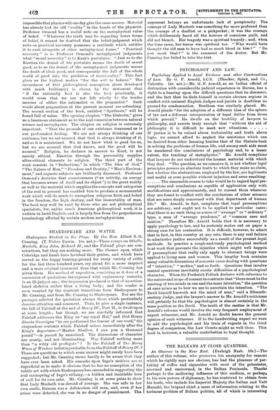SHAKESPEARE AND WATER.
Shakespeare Studied in Six Plays. By the Hon. Albert S. G. Canning. (T. Fisher Unwin. 16s. net.)—These essays on Othello, Macbeth, King John, _Richard II., and the Falstaff plays are con- scientious, but they are nothing more. The themes upon which Coleridge and Lamb have lavished their genius, and which have served as the happy hunting-ground for every variety of critic for the last three hundred years, cry aloud for a more inspired and a more original treatment than that which Mr. Canning has given them. his method of exposition, consisting as it does of a succession of quotations interspersed with explanatory remarks, is an ill-judged one ; the impression produced is that of an articu- lated skeleton rather than a living body ; and the reader is soon wearied by the constant transitions from Shakespeare to Mr. Canning, and from Mr. Canning to Shakespeare. Nor are the passages selected for quotation always those which particularly deserve attention and comment. Thus, to give a single instance, the fall of Falstaff at the end of Henry IV., Part II., is dwelt upon at some length ; but though we are carefully informed that Falstaff addresses the King as "my royal Hal," and that Henry directs Gascoigne "to see performed the tenour of our word," the stupendous sentence which Falstaff utters immediately after the King's departure—" Master Shallow, I owe you a thousand pound "—is passed by unnoticed. The discussions of character are scanty, and not illuminating. Was Falstaff nothing more than "a witty old profligate " ? Is the Falstaff of The Merry Wives of Windsor indistinguishable from the Falstaff of Henry IV. ? These are questions to which some answer might surely have been suggested; but Mr. Canning seems hardly to be aware that they have over been asked. His remarks upon Iago's motives are so superficial as to make it obvious that he has no conception of the subtle art with which Shakespeare has succeeded in suggesting the real mainspring of Iago's villainy,—a hidden and insatiable love of evil for its own sake. Mr. Canning is at some pains to show that Lady Macbeth was devoid of courage. She was safe in her own castle, Duncan was a defenceless old man, and, even if her crime were detected; she was in no danger of punishment. The
argument betrays an unfortunate lack of perspicacity. The courage of Lady Macbeth was something far more profound than the courage of a duellist or a pickpocket ; it was the courage which deliberately faced all the horrors of conscious guilt, and did not blench. Her tragedy was a spiritual tragedy ; and, when the time came, her terror was spiritual too. " Who would have thought the old man to have had so much blood in him P " " Do you mark that ? " is the comment of the doctor, But Mr. Canning has failed to take the hint.






























































 Previous page
Previous page